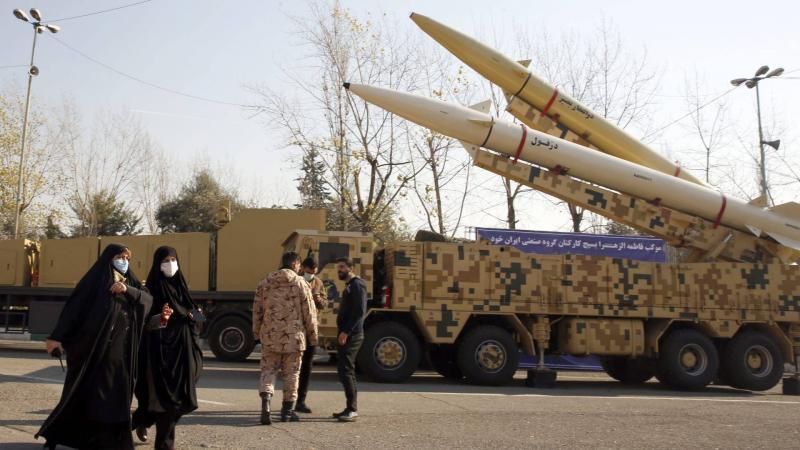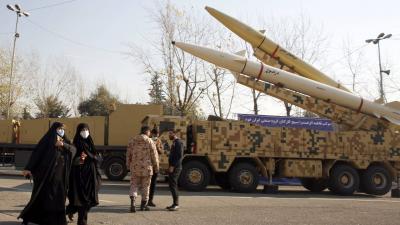The commander of the missile unit in the Iranian Revolutionary Guard Corps (IRGC), Amir Ali Hajizadeh, warned of the potential for the war in the region to expand, stating that "the war has extended to Lebanon, and the level of confrontations is likely to increase." He emphasized that Iran is prepared for all scenarios amidst the uncertain future of the current conflict. Hajizadeh addressed the regional situation shortly after U.S. airstrikes targeted a military facility linked to Iran in Syria.
Iranian media reported Hajizadeh's remarks to journalists today, stating that "the issue of Gaza has become a global issue," and referred to a "great strategic victory for Palestinian fighters" in reference to the attack launched by Hamas on October 7. He declared: "This great victory cannot be erased by tactical and criminal operations and the killing of children."
When asked about the likelihood of Iran responding to the war expanding from Gaza to Lebanon and Hezbollah, Hajizadeh said, "The war has expanded today, and Lebanon is a party to it, and the intensity of the conflict is likely to increase even more than it currently is, as the future is uncertain. Iran is prepared for all situations."
Hajizadeh made his first comments since the outbreak of the war in Gaza last month during a conference commemorating his predecessor in the missile unit of the IRGC, Hassan Tehrani Moghaddam, the architect of Iran's ballistic program, who was killed in a massive explosion at a missile factory in the fortified Malard area east of Tehran on November 12, 2011, which resulted in the death of 36 IRGC personnel. The explosion was attributed to Israeli fingerprints. This incident marked a prominent event in the Israeli-Iranian shadow war that has involved nuclear scientists, military officials, nuclear and military facilities in Iran, as well as Israeli commercial vessels in international waters.
In a veiled reference to a warning issued by U.S. President Joe Biden to Iranian Supreme Leader Ali Khamenei, Hajizadeh provided his account of the exchanges between the two sides, saying: "The Americans are not threatening Iran because in their correspondence with Iran, which on some nights involved three messages, they speak in a language of hope and desire."
Hajizadeh stated: "Iran is not in a position to be threatened by others; we are at the peak of our power and ready for all situations." He pointed out that "the issue of the Zionist entity has transcended that of vengeance and confrontation and the liberation of prisoners." He added: "It seems that this is a personal vendetta issue for Netanyahu and the rulers of Israel, as they know that if a ceasefire is announced today, the war government will lose much of its authority, and Netanyahu must go to court the next day."
He noted: "If the war continues for another month, they will not achieve any success other than increasing their casualties." He expected Israel to depart "astronomically" from pre-war conditions. He said that "the helicopters transporting wounded soldiers do not have the opportunity to refuel, thus they refuel in the air."
Hajizadeh also expressed his belief that "the costs of war are increasing; the Americans themselves consider themselves partners in Israel's fate, and in the future, they will pay the price from the pockets of American taxpayers..." He also stated: "Today, the Resistance Axis is at work," specifically mentioning armed Iraqi groups and the Houthi group in Yemen.
Iranian officials refer to armed groups they describe as Iranian proxies as the "Resistance Axis." U.S. forces have faced over 45 attacks from Iran-aligned groups in Syria and Iraq. U.S. forces conducted airstrikes on Sunday that targeted facilities in eastern Syria used by the IRGC. U.S. Defense Secretary Lloyd Austin stated that "the strikes targeted a training facility and a cache near the cities of Boukamal and Mayadin, respectively." This was the third such attack after U.S. forces targeted two facilities storing Iranian weapons last Wednesday in Syria. The Syrian Observatory for Human Rights reported that the military death toll among Iran-aligned militias reached eight, including one Syrian and two Iraqis.
In a parallel context, Iranian Foreign Ministry spokesman Nasser Kanaani stated at his weekly press conference on Monday that "the Resistance groups do not take orders from Iran, nor do we instruct them; they make their own decisions directly."
Kanaani advised the U.S. administration to "pay attention to its unacceptable behavior and actions in supporting the Zionist entity instead of making accusations." He stated: "America is responsible for the war, as it blocked a resolution in the Security Council to end Israeli attacks," repeating previous statements from senior Iranian officials, led by the decisive voice in the ruling establishment, Ali Khamenei.




